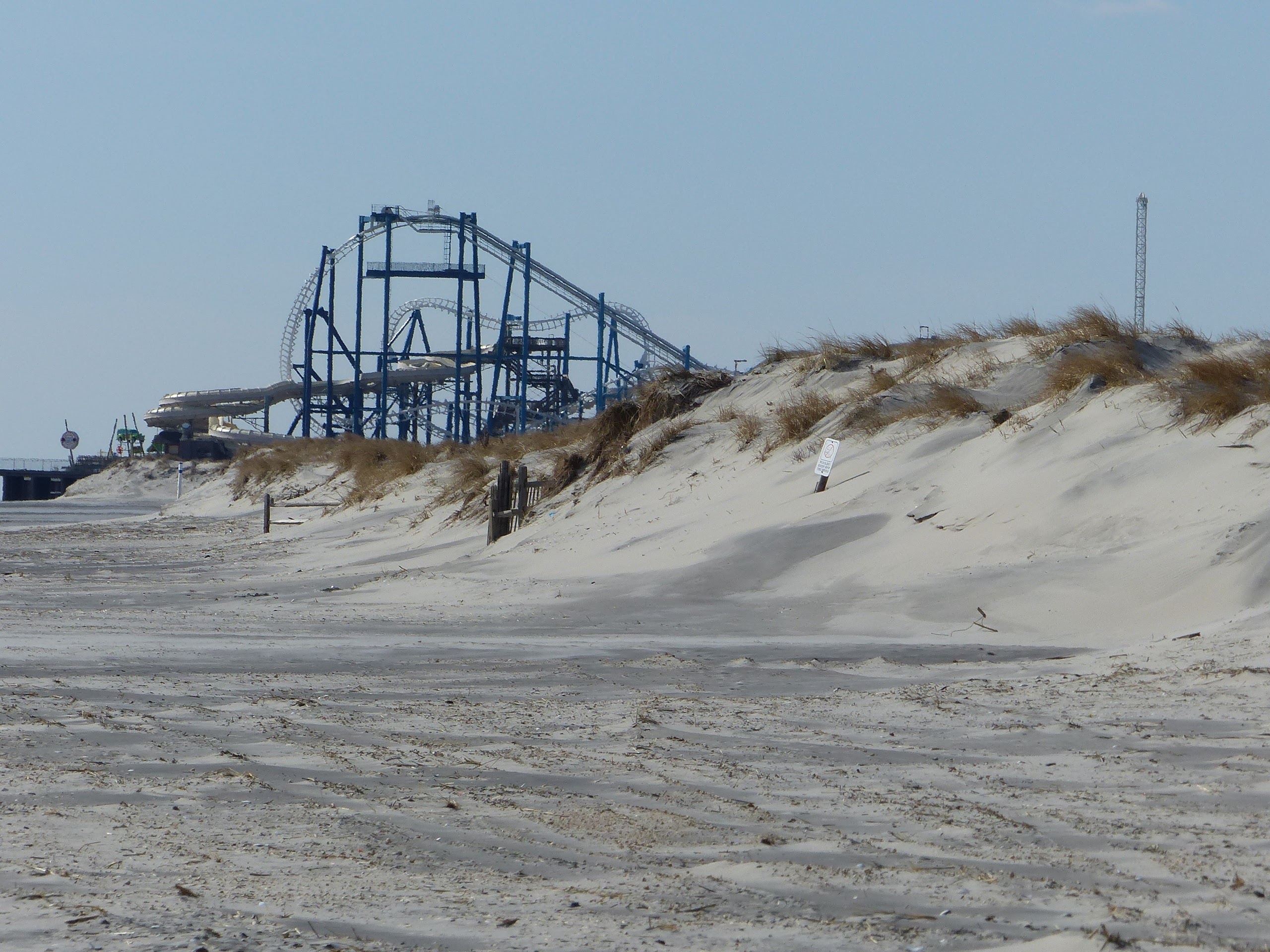CREST HAVEN— Bridget O’Connor knows recycling.
As recycling coordinator for the Cape May County Municipal Utilities Authority, she’s been responsible for the recycling program in the county for over 20 years. During a recent tour of the county landfill and Intermediate Processing Facility (IPF) in Woodbine, she asked her audience of one, “Who is the most important person when it comes to keeping recyclables out of landfills?”
“You!” she answered rhetorically.
But she was not talking to just this writer. She’s given that talk many times, and admits the last part of it is a bit “cheesy.” But the substance of her message is very important and has a wide audience. O’Connor said it is every person who is reading this story, along with all those who live, work, play and throw away trash in Cape May County, who contributes first and foremost to the success or failure of the county recycling program.
Tapping the Landfill for Methane
Keeping recyclables out of landfills is O’Connor’s mission. As of March, a new program in the county utilizes cutting edge technology at the IPF at Woodbine to harvest methane gas from the county landfill. That methane is then reused as an energy source.
Methane gas is created in the landfill naturally, as a byproduct of the natural decomposition process. Rather than allowing that gas to escape, which is not only a waste, but also contributes greenhouse gasses to the atmosphere hastening global warming, the county has engineered a means of capturing it, and “recycling it.” Methane is captured through pipes laid within the landfills. It travels through those pipes to the state’s Woodbine Developmental Center, a state residential facility serving approximately 700 men with mental retardation and/or other developmental disabilities, where the methane is piped into retrofitted boilers. The methane is burned, similar to natural gas that heats and cools homes, providing the entire energy needs of the Center.
Thus, the county’s landfill is responsible for bringing Woodbine Developmental Center’s gas bill to $0. According to the federal Environmental Protection Agency, the Woodbine facility program processes 417 cubic feet of methane per minute, and creates annual greenhouse gas reductions equivalent to planting 13,600 acres of forest, removing the emissions of 9,500 vehicles, or preventing the use of 115,700 barrels of oil. Annual energy savings equate to heating 3,100 homes.
But there’s more.
The landfill produces enough methane to also run the entire IPF, itself. It is processed at a new electric generating facility that has been up and running since March 6. Similar retrofitting provides the entire energy needs to run the machinery inside the IPF building where the county’s plastic, steel, aluminum and paper recyclables are processed. This means, of course, that the entire recycling facility at Woodbine is completely energy self-sufficient, with a gas bill of $0, saving county taxpayers an average of $11,800 per month, O’Connor said. The design work was done in-house and the authority took on the role of general contractor. The system has two scrubbers to clean the methane before it is piped to the two internal combustion engines that convert it to electricity.
The MUA bid out certain aspects and kept some of the construction work in-house and finished it all under $1 million.
A third of that came from a grant from the BPU. Under its Clean Energy Program, the BPU provides $180 million annually to promote energy efficiency and renewable projects.
But there’s more, still.
Leftover methane is then sold back to the region’s energy grid.
That means that the facility is not just providing the entire energy needs of one large state institution in the county and one large processing facility, it is also creating revenue for county taxpayers.
In May, that credit amounted to $5,500. Add this revenue to the savings of gas expenses for these two facilities, and one immediately sees that recycling is not just something environmentalists care about. It is a means of boosting the local economy.
How the Facility Operates
The IPF here is a large facility where the county’s recycling ends up after collection in order to be sorted, and then bundled into large bales. Up to 15 tons of paper per hour and 10 tons of cans and bottles per hour can be processed. It is then sold to private contractors for their reuse in the manufacture of new products.
Municipalities collect curbside and the IPF accepts: mixed paper including newspaper, magazines, office paper, corrugated cardboard and junk mail and commingled cans and bottles including: aluminum and steel (tin) cans, glass bottles and jars, and plastic bottles that have a 1 or 2 imprinted on the bottom. Common examples of the plastic bottles accepted are gallon milk jugs, detergent bottles, shampoo and other personal care bottles, all number 2 and soda bottles and single serve water bottles, number 1. Recyclables come in on trucks to the tipping floor, where a front-end loader scoops it into large piles and loads material onto a conveyor belt.
Once on the proper conveyor belt, recyclables are processed into saleable commodities that meet market specifications. On the paper line, for example, heavy cardboard is separated out from lighter paper with a disc screen. A rotating disc with serrated edges catches the corrugated cardboard, while allowing the lighter paper to fall through below.
Quality control workers make finer sorts along the paper line where they pull out non-recyclables with a trained eye and steady hand. On the can and bottle line, recyclables pass through a large rotating drum fitted with magnets along the edge which capture steel cans, and aluminum and plastic bottles are separated from glass by a giant fan. Plastic bottles are first pierced then flattened to leave as little air as possible inside, then hand-sorted by resin type and baled.
Glass is mechanically crushed to uniform size. Aluminum cans are the last commodity to be sorted and baled. Once all the recyclables have passed through their processing, they are compressed into huge bales which are then wrapped tight with wire straps to maintain their form for shipping.
One tip O’Connor has that seems simple, but makes a big difference in the end: be sure when placing plastic bottles at the curb to take off the caps. Why? The air in the bottle makes flattening the bottle, a necessary part of the process, more difficult.
Plastic soda bottles, for example, expand somewhat after they are compressed into bales, and that expansion can be intensified if caps are left on, causing the bale to fall apart.
The facility also accepts tree stumps along with clean pallets for chipping into mulch, which is available for purchase; computers and electronics; and, hazardous waste including solvents, paint and batteries. For information on guidelines for recycling, see www.cmcmua.com.
New Drop-Off Program for Mixed Rigid Plastics
The county is also now accepting a new form of plastics for recycling in a voluntary drop-off program. Mixed Rigid Plastics, or MRPs, are accepted at the Burleigh Transfer Station, 650 South Shunpike Road (Route 620), which is off of Indian Trail Road, just past Home Depot on the right, and Woodbine Landfill Complex, 2050 Route 610 Dennisville-Petersburg Road, Woodbine. (Entrance is across from Mouse Trap Bowling Alley).
Residents, visitors and businesses can visit the sites and drop off items at both locations. MRPs are harder plastics, such as milk crates, laundry baskets, plastic drums typically used on construction sites, plastic toys and playhouses, plastic shelving, empty garbage cans, computer housings (without the circuits), and automotive plastics, for example. Items must be clean. Although PVC and vinyl siding are not acceptable, MRPs are found quite commonly in household items. MRPs cannot be put out on curbs for pickup, however. They must be taken to either facility, although some municipalities might now or soon offer a separate collection service. For information, contact your town’s municipal recycling coordinator.
‘You’ Can Make a Difference
O’Connor’s message is both complex and simple. The process of recycling can be complicated. But making it as simple as possible at the front of the line is O’Connor’s goal. Persons in the county can contribute to making the recycling program work most efficiently and effectively, she said, by making good choices about how they dispose of their plastics, paper, steel and aluminum. For information, call 609-465-9026.








